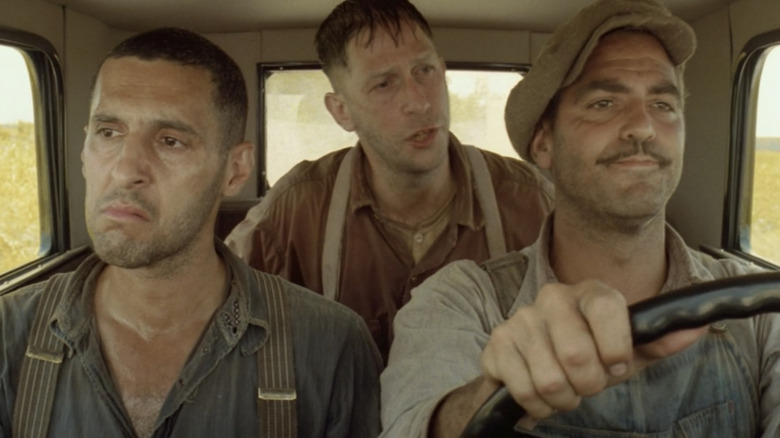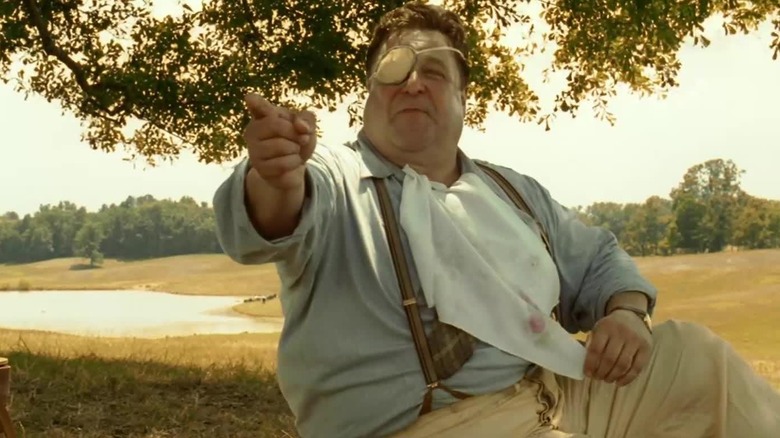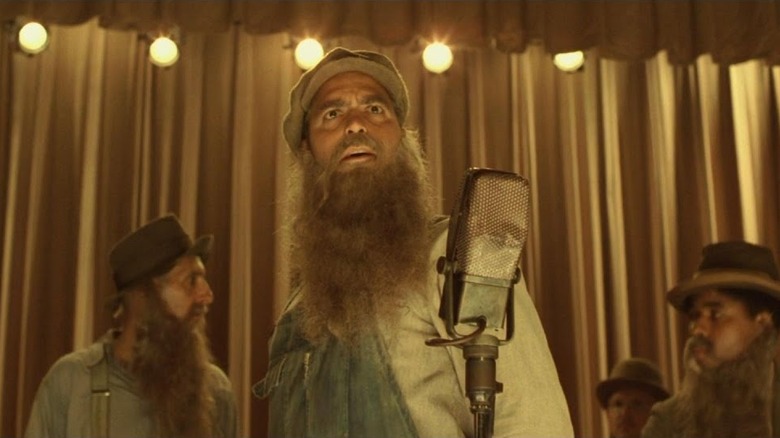The Coen Brothers' Crime Adaptation Of The Odyssey Came Out Years Before The Christopher Nolan Version
One of the great things about the classics is that they're still relatable centuries after they were first written, though sometimes it takes a little updating for contemporary audiences to buy in initially. In fact, sometimes it's best to hide the fact that something is based on a classic piece of literature or mythology at all. Seriously, there are quite a few great movies secretly inspired by Greek mythology, and one of the greatest of them all is a Coen Brothers' crime movie set in 1930s Mississippi.
"O Brother, Where Art Thou?" is fascinating because the Coens were originally inspired to try and write their own version of "The Wizard of Oz" by way of "Sullivan's Travels," and they ended up stumbling into a story that bore a fair resemblance to Homer's "Odyssey." Instead of backtracking, they leaned into it, and once you realize the connections between the ancient Greek work and the 2000 crime comedy, they're impossible to ignore. "O Brother, Where Art Thou?" is a brilliant comedy with one of the best soundtracks in cinema history, and it's also a much easier way to get high school students to care about "The Odyssey" than making them watch the 1997 miniseries starring Armand Assante as Odysseus. Trust me on this one.
While "O Brother, Where Art Thou?" takes place hundreds of years after Homer's hero allegedly lived, the story is pretty darn similar, and there are some truly hilarious twists on familiar characters.
O Brother, Where Art Thou? showed the humanity in Homer's Odyssey
In "The Odyssey," the King of Ithaca, Odysseus, is on his way home to his wife Penelope after the Trojan War when he gets delayed by all kinds of nonsense, dealing with a cyclops, a witch, sirens and more before getting home and discovering his wife is being courted by men who believe him to be dead. In "O Brother, Where Art Thou?," chain gang convict Ulysses (George Clooney) is on his way back to his wife after escaping his imprisonment, and he ends up delayed by some strangely familiar figures, then gets home to find his ex-wife Penny (Holly Hunter) is about to marry another man.
Instead of a mythological cyclops, Ulysses faces a one-eyed Bible salesman (played with aplomb by John Goodman), which is pretty great. The sirens are three women washing their clothes in the river and singing, but they also end up crossing over with Circe, the witch from "The Odyssey" because Ulysses and his two fellow escapees, Delmar (Tim Blake Nelson) and Pete (John Turturro) get drunk on corn whiskey with them and Delmar ends up thinking they turned Pete into a toad, just like Circe turns members of Odysseus's crew into animals in "The Odyssey." Everyone is delivering killer performances, especially Clooney as the turbo-charismatic but smug Ulysses, and the movie's big climax is quite similar to that of "The Odyssey," except it's reliant on Ulysses's charm instead of Odysseus' steel.
Ulysses had that Odysseus swagger
The big climax in "The Odyssey" involves Odysseus sneaking his way into his old home and getting a chance to try to woo his wife because of his long, scraggly beard. He still manages to kick some serious suitor butt, however, and rescues Penelope and their son Telemachus, and the three of them have a happy reunion. Instead of fighting Penny's suitor, Ulysses and his two fellow escapees, along with their new friend Tommy (Chris Thomas King), put on a performance for all of the townsfolk as the fake band the Soggy Bottom Boys. Their performance was so good that it earned them pardons for their crimes when they revealed their actual personas, and Penny even agrees to remarry Ulysses. Without Clooney's stellar lip-syncing and dancing performance (and killer eyebrow-wiggling skills), that scene could never work.
"O Brother, Where Art Thou?" was a massive hit for the Coens, and it's still one of their best films. It's a gorgeous, hilarious movie with a story that's drawn from classic myth and classic Hollywood alike, and while Christopher Nolan's upcoming adaptation will be more accurate to the actual myth, "O Brother" is still an all-timer.


